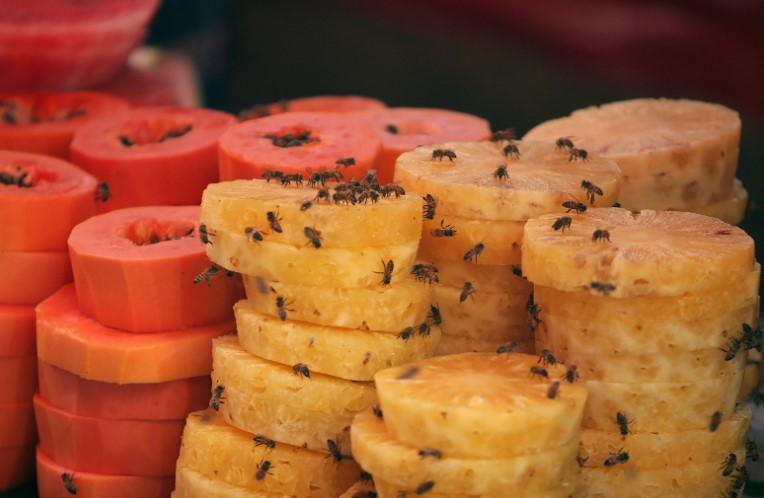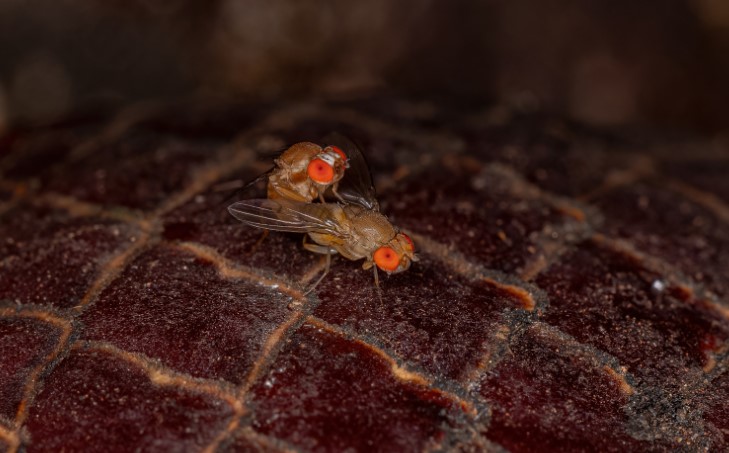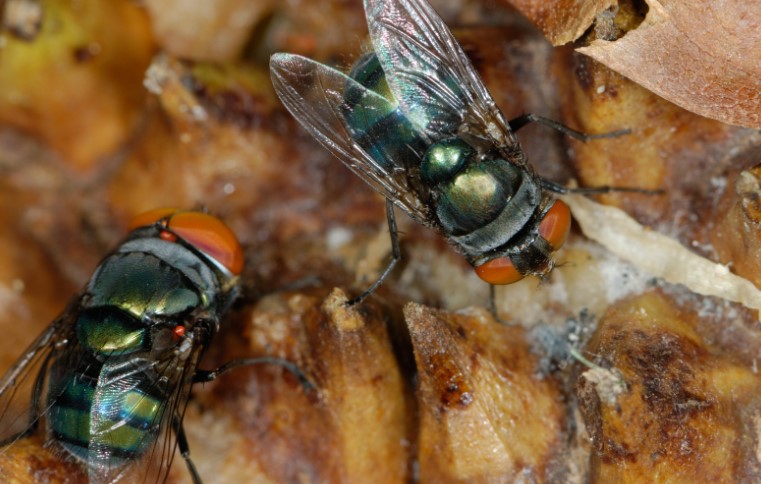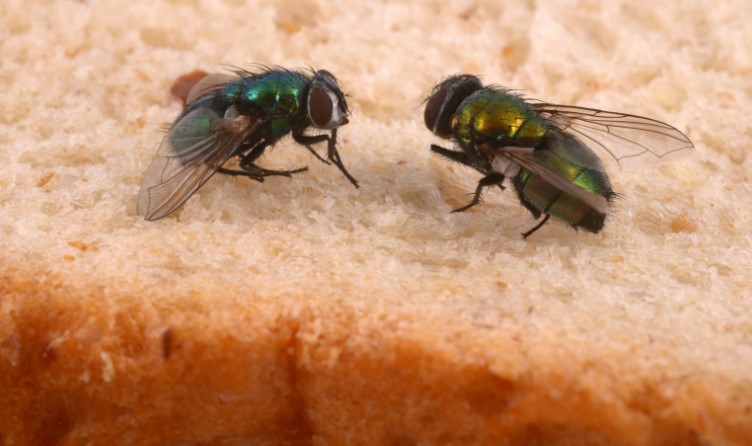
How to Remove Fruit Flies? – Natural DIY Tips
Need tips on how to remove fruit flies? Fruit flies can be a major nuisance in the home, particularly in the kitchen where they tend to gather around ripened fruits, vegetables, and any fermenting organic material. These tiny pests are not only annoying but can also pose a risk of contaminating food with bacteria. This guide will walk you through some effective, natural DIY methods to remove fruit flies and prevent future infestations.
What Attracts Fruit Flies to Your Home?
Fruit flies are primarily attracted to ripening or fermenting fruits and vegetables. The scent of sugar and alcohol produced during the fermentation process draws these flies in from outside or other parts of your home. They are particularly fond of bananas, tomatoes, onions, and overripe fruits that are left out on counters.
Besides fruits and vegetables, they also thrive in moist environments like drains, garbage disposals, compost bins, and even sponges. The warm, damp conditions in these places are ideal for fruit flies to breed, leading to a rapid increase in their population if not addressed promptly.

How to Remove Fruit Flies Using Natural Methods?
DIY Vinegar Trap
One of the most effective and simple methods to get rid of fruit flies is to create a vinegar trap. Here’s how you can do it:
- Materials: You’ll need a small bowl, apple cider vinegar (or white vinegar), and a few drops of dish soap.
- Instructions: Fill the bowl with vinegar and add a couple of drops of dish soap. The vinegar attracts the fruit flies, and the dish soap reduces the surface tension of the liquid, causing the flies to sink and drown when they land on the surface.
- Placement: Place the bowl where you’ve noticed fruit fly activity, such as near fruit bowls, bins, or drains. This trap works quickly, and you should start seeing results within a few hours.
Essential Oil Spray
Essential oils such as lemongrass, peppermint, and lavender can be used to repel fruit flies naturally. These oils have strong scents that fruit flies dislike, making them an excellent deterrent.
- Materials: Essential oil (lemongrass, peppermint, or lavender), water, a spray bottle.
- Instructions: Mix about 10 drops of essential oil with a cup of water in a spray bottle. Shake well before use.
- Application: Spray this mixture around areas where fruit flies are commonly seen, such as kitchen counters, near windows, and around trash bins. You can also soak cotton balls in the mixture and place them in problem areas.

Wine Bottle Trap
If you have a little leftover wine, you can use it to create another effective trap for fruit flies. Fruit flies are drawn to the fermented smell of wine, making it an ideal bait.
- Materials: A wine bottle with a small amount of wine left in it.
- Instructions: Leave a small amount of wine in the bottom of the bottle. The fruit flies will be attracted to the wine, enter the bottle, and due to the narrow neck of the bottle, will have difficulty escaping.
- Placement: Place the bottle near fruit fly hotspots. Once the bottle has trapped a significant number of flies, dispose of it.
Milk, Sugar, and Pepper Trap
This traditional method uses common household ingredients to create a trap that lures and captures fruit flies.
- Materials: 1/2 cup of milk, 2 tablespoons of sugar, 2 tablespoons of ground black pepper, a shallow dish.
- Instructions: Heat the milk in a pan and add the sugar and pepper. Stir until the sugar dissolves. Pour the mixture into a shallow dish.
- Placement: Place the dish near where you’ve seen fruit flies. The sweet smell will attract them, and they’ll drown in the mixture.
Fruit Bait with Plastic Wrap Cover
This method involves using a piece of overripe fruit to lure the flies into a trap.
- Materials: A piece of overripe fruit, a container, plastic wrap, a toothpick.
- Instructions: Place the piece of fruit in a container and cover it tightly with plastic wrap. Use a toothpick to poke a few small holes in the plastic wrap.
- Placement: Set the container near where fruit flies are active. They will be attracted to the fruit, crawl through the holes, and become trapped under the plastic wrap.
How to Prevent Future Fruit Fly Infestations?
Once you’ve managed to remove the fruit flies, it’s crucial to take preventive measures to ensure they don’t return.
Proper Storage of Fruits and Vegetables
One of the simplest ways to prevent fruit flies is to store your fruits and vegetables properly.
- Refrigeration: Store ripe fruits and vegetables in the refrigerator to slow down their ripening process and make them less attractive to fruit flies.
- Sealed Containers: Use airtight containers for any produce that you keep on the counter. This will keep the fruit flies from detecting the scent of the fruits and vegetables.
Regular Cleaning and Waste Management
Maintaining a clean kitchen and properly managing waste is key to preventing fruit flies.
- Surface Cleaning: Regularly wipe down counters, clean up spills immediately, and avoid leaving dirty dishes in the sink. Ensure that you clean under appliances and in small crevices where food particles might accumulate.
- Waste Management: Empty your trash bins regularly, especially those that contain food waste. Consider using a bin with a tight-fitting lid to prevent fruit flies from getting inside. Also, clean your bins periodically to remove any food residues that might attract flies.

What are The Additional Preventive Measures?
Implementing a few more preventive measures can make a big difference.
- Drain Maintenance: Keep kitchen drains clean by regularly flushing them with hot water or a natural cleaner like a mixture of baking soda and vinegar. This will help eliminate any organic matter where fruit flies might lay their eggs.
- Mesh Covers: Use mesh covers over fruit bowls and other produce to create a physical barrier that keeps fruit flies away.
- Leak Fixing: Fix any leaks in your kitchen to reduce moisture, as fruit flies are attracted to damp environments.
Conclusion
Fruit flies can be a persistent problem, but with the right natural methods, they can be effectively managed and prevented. By understanding what attracts them and taking proactive steps to eliminate those attractants, you can keep your home fruit fly-free.
Remember, prevention is always better than cure, so be diligent about maintaining a clean and dry environment, storing food properly, and regularly cleaning areas where fruit flies might breed. With these tips on how to remove fruit flies, you’ll be well on your way to a fruit fly-free home.
FAQs on Fruit Fly Control
1. Why Are Fruit Flies So Hard to Get Rid Of?
Fruit flies are challenging to eliminate because they have a rapid life cycle and can lay hundreds of eggs at a time. The eggs hatch into larvae within just a few days, and the entire cycle from egg to adult fly can be completed in about a week.
This means that if you don’t address the breeding grounds, new generations of fruit flies can quickly replace the ones you’ve managed to kill.
2. Can Fruit Flies Cause Health Issues?
Yes, fruit flies can pose health risks. They are known to carry bacteria from rotting food and other unsanitary places, which can then contaminate the food you eat. This contamination can lead to foodborne illnesses. Therefore, it’s important to get rid of fruit flies promptly and maintain good kitchen hygiene.
3. What Should I Do If DIY Methods Don’t Work?
If DIY methods fail to eliminate your fruit fly problem, it may be time to consider professional pest control services.
A professional can assess the severity of the infestation and use stronger, more effective treatments that aren’t available to the general public. Additionally, they can help identify and address the root causes of the infestation.
4. How Long Does It Take to Get Rid of Fruit Flies?
The time it takes to get rid of fruit flies depends on the severity of the infestation and the methods used. In most cases, you should start seeing a reduction in fruit fly numbers within a few days of setting traps and eliminating breeding grounds.
However, it’s important to continue monitoring and maintaining preventive measures for at least two weeks to ensure that any remaining eggs have hatched and the flies have been dealt with.
5. Can Fruit Flies Come from Store-Bought Produce?
Yes, fruit flies can indeed hitch a ride into your home on store-bought produce.
The eggs or larvae may already be present on the fruits and vegetables when you buy them, especially if the produce has been sitting out for a while. To reduce this risk, wash all produce as soon as you bring it home and inspect it for any signs of fruit fly activity.
